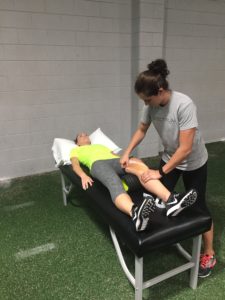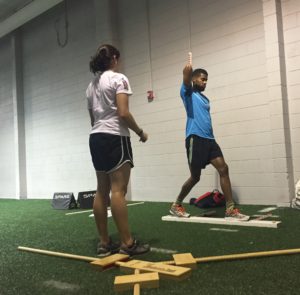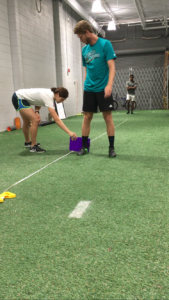I Have Been Cleared by my Physician to Return to Sport, What do I do now?
 By: Dr. Rachel Jakubowski
By: Dr. Rachel JakubowskiPhysical Therapist
SPECTRUM, Inc
No matter if you had a menisectomy, meniscus repair, ACL reconstruction, or achilles tendon reconstruction, our jobs as physical therapists and performance coaches is to set you up to perform at your best with the lowest risk for re-injury possible. To do this we need tests and measurements that tell us when you are actually ready, versus just going by how you feel. The numbers don’t lie so we have to be strategic and methodical to make sure we are safely getting you back to your sport.
Let’s describe a typical scenario:
You are 5-6 months out of your ACL reconstruction surgery. You have been discharged from normal Physical Therapy and cleared by your physician to return to your sport. Inside, you are cheering because you are anxious to start playing soccer, basketball, lacrosse, or whatever your sport is. You are feeling pretty good jogging, but more than likely haven’t fully tested out your knee sprinting, cutting, turning, or jumping at max speed/effort. You haven’t had your reaction time tested because you haven’t had to face off against an opponent on the field.
 When a physician clears you to return to sport it doesn’t mean you should go crazy and start playing in games. It means that you are safe to start integrating movements that are required of your sport–cutting, changing directions, sprinting, and doing drills that challenge your reaction time, in a controlled environment. In most sports your movement is mainly reactionary. You can try to anticipate what your opponent is going to do or place yourself in tactically smart positions, but you still don’t fully know what’s going to happen next. No opponent is going to give you the time to make sure you plant your foot properly or maintain proper form while running.
When a physician clears you to return to sport it doesn’t mean you should go crazy and start playing in games. It means that you are safe to start integrating movements that are required of your sport–cutting, changing directions, sprinting, and doing drills that challenge your reaction time, in a controlled environment. In most sports your movement is mainly reactionary. You can try to anticipate what your opponent is going to do or place yourself in tactically smart positions, but you still don’t fully know what’s going to happen next. No opponent is going to give you the time to make sure you plant your foot properly or maintain proper form while running.
This is why you need a strategic training approach that gradually incorporates all of the components mentioned above to fully make sure you are ready to return to sport.
Once immersed in a return to sport program, testing is crucial to make sure that your right and left leg are symmetrical. Just because you feel good doesn’t mean your body is moving well. Typically when individuals are discharged from physical therapy or cleared by their physician, the leg that was operated on is 85% of the healthy leg. That means there is a 15% difference between your right and your left leg. Ideally, to put yourself in the optimal movement (minimal injury risk) category you want your surgical leg to be 95% of the healthy leg –meaning only a 5% difference.
 In the past, most individuals were returned back to sport in 4-6 months after an ACL reconstruction. Nowadays, the research is showing you are looking more at 6-9 months, with some players even needing 9-12 months to return to full competition.
In the past, most individuals were returned back to sport in 4-6 months after an ACL reconstruction. Nowadays, the research is showing you are looking more at 6-9 months, with some players even needing 9-12 months to return to full competition.
The screens we use to test for symmetry, movement compensations, muscle weakness, and injury risk are the Functional Movement Screen (FMS), Selective Functional Movement Assessment (SFMA), Y Balance test, and hop testing. We not only use these tests to determine when you are cleared to return to full competition, but also incorporate your results to design a training program specifically tailored to you.
 Previous injury is the number 1 risk factor for future injury. Unfortunately, that’s something you can’t change, but there are factors that you can fix to make sure that your risk for re-injury is as low as possible. When you go through a significant injury and surgery the goal is to go through it once. Take the time (even if it is 9-12 months) to make sure you are rehabbing properly the first time so that you don’t have to go through it all over again. Make sure you have a training staff that is taking you back to your full potential the smart way.
Previous injury is the number 1 risk factor for future injury. Unfortunately, that’s something you can’t change, but there are factors that you can fix to make sure that your risk for re-injury is as low as possible. When you go through a significant injury and surgery the goal is to go through it once. Take the time (even if it is 9-12 months) to make sure you are rehabbing properly the first time so that you don’t have to go through it all over again. Make sure you have a training staff that is taking you back to your full potential the smart way.
At Spectrum, our Return To Sport program takes our performance methodology and digresses/modifies it to bridge the gap between rehab and performance. The physical therapist analyzes your movement, takes you through functional movement screening, and then helps design your program with the performance coach.
For more information on this subject check out a previous blog: Being Cleared By Your Doctor Doesn’t Mean You’re Ready
Leave a Reply